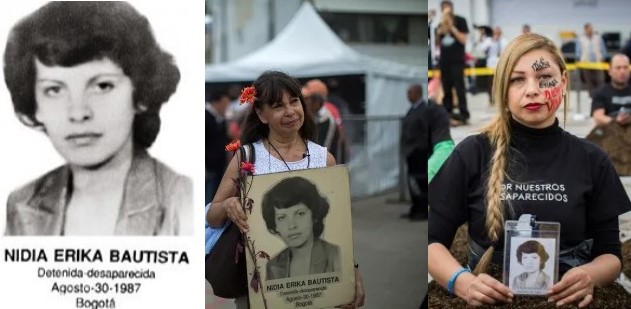On March 8, PBI-Colombia tweeted:
“We accompany @nydia_erika [the Nydia Erika Bautista Foundation] to Washington due to the serious situation of impunity for forced disappearance in Colombia and to request the declassification of intelligence files to access information on the whereabouts of the victims and support for the law on women seekers and their protection.”
Declassification of intelligence files
In June 2022, Semana reported: “[The Truth Commission has recommended the declassification of intelligence files and has] proposed that these documents be kept confidential for only 15 years, and not for 30 years as is currently the case.”
The Commission’s final report also recommended that the president of Colombia ask the president of the United States to expedite the declassification of documents from US government agencies related to the Colombian armed conflict.
The article adds: “The president of the Truth Commission, Father Francisco de Roux, presented the recommendations made by the entity to the government to heal the wounds of the armed conflict and answer the multiple questions presented by the victims to understand the horror.”
Father de Roux says: “We ask the justice system to put an end to impunity, rebuild confidence in the state, guarantee the impartiality and independence of the investigative and judicial bodies, and protect the victims and judges who participate in these processes of truth and justice.”
Law on women seekers
In June 2022, El Espectador also reported: “The Nydia Erika Bautista Foundation and seven organizations of victims of forced disappearance from different regions of the country delivered a document to Father Francisco de Roux with 15 recommendations that they hope that entity will record in its final report.”
Along with the recommendation of declassifying military archives, it was also proposed to create a Law for the Protection of Women Seekers.
El Espectador explains:
“Comprehensive Law for the Protection of the Rights of Women and Family Seekers: The victims also demand that State policy include a law that recognizes their rights, their contribution to the truth and the costs that their work has implied in their lives and in their physical, mental and family integrity. “A Comprehensive Law that dignifies their ethical and political role in society and the democratic rule of law and as women caregivers heads of family to whom the State has de facto delegated the search for the disappeared,” the document says.
Protect the rights of missing women and searchers who have been victims of sexual violence so that they can access truth and justice. The document argues that there is a “total absence of criminal and disciplinary investigation of gender violations – including sexual violence – suffered by disappeared women and perpetrated against women searchers, under the armed conflict.””
PBI-Colombia has accompanied the Nydia Erika Bautista Foundation occasionally from 2007 and in full since 2016.
The Foundation was created in 1997. It has placed the issue of the enforced disappearance of more than eighty thousand people as a result of the armed conflict on the national agenda and has promoted national legislation on the subject. It was named after Nydia Erika, Yanette’s 32-year-old sister, who was disappeared on August 30, 1987 during an operation carried out by Army Brigades III and XX. There are indications that Nydia Erika suffered torture and sexual violence during her captivity before being executed.
Photos: Nydia Erika Bautista, her sister Yanette, and Yanette’s daughter Andrea Torres Bautista.
Published by Brent Patterson on




